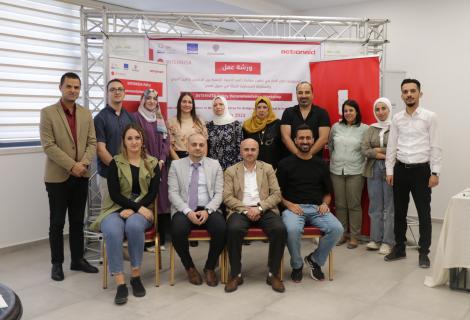ActionAid Palestine to Organize a workshop Expanding the Participation of Policy Makers in the INTERNISA Project

Hebron-West Bank -ActionAid Palestine (AAP) organized a workshop titled with “Responsibility of decision-makers for developing policies for bridging gender digital gap and promoting equal opportunities and participation of women in labor market”. This workshop is part of INTERNISA project -Developing the INTERNISA network of synergies to increase the number of digitally skilled women employed in the ENI CBC MED territories via matching demand and supply in the labour market -which is funded by ENI CBC Med Programme and it is being implemented in Greece, Jordan, Spain, Tunisia, Lebanon, Palestine, Italy.
Representatives of government ministries, community and academic institutions based in the governorates of Hebron and Bethlehem participated in this workshop, including the ministries of economy and labor, Hebron Chamber of Commerce and Industry, Palestine Polytechnic University, Palestine Ahliya University, and representatives of civil institutions in Hebron, in addition to a number of young men and women.
This workshop aimed to look into the current policies and practices related to digital skills for women and their relevance to the labor market and the digital gender gap in the labor market. The workshop presented the outcomes and inputs of INTERNISA project to decision-makers. The workshop also sought to increase networking between relevant institutions and stakeholders so that they could exchange experiences and knowledge in this field. The workshop discussed how to develop policies to bridge the digital gender gap and improve existing policies to enhance women's access to the labor market and increase their economic participation. This workshop highlighted the importance of digital skills for young women as a mean for entering labour market. The workshop also focused on how decision-makers can contribute to bridging the digital gender gap in the labor market and matching between supply and demand.
The workshop was interactive and included discussions, debates, group work and brainstorming tasks and presentations for collecting data and presenting recommendations. The workshop’s recommendations were taken from participants’ answers and recommendations. It was recommended that it is necessary to develop the advanced digital skills for women such as e-marketing, photography, graphic design and other skills required for the labor market. The participants recommended to allocate budgets for facilitating the process of digital transition in public, governmental and academic institutions, developing digital skills of workers, training programs and modern technology and providing Internet services, technological equipment, computers and digital platforms for women in marginalized areas. The workshop recommended creating changes in recruitment procedures and policies, through the development of reliable measurement tools for digital skills and continuing training staff members on the latest technological and digital developments. The recommendations also highlighted the importance of targeting People with Disabilities and integrating them into society, by developing their digital skills. The workshop demonstrated the need to raise digital awareness, fight digital illiteracy, and promote a positive culture of digitization in society, especially among school students allowing them to acquire basic digital skills. Participants also emphasized the need to enforce and adhere to general policies in the Labor Law, especially issues of equal pay and equal opportunities. Furthermore, it was highlighted that empowering women can be achieved by creating commercial brand for their products and women should be empowered in all fields along with raising the awareness of community on issues of labor rights. The workshop recommended to exchange experiences and knowledge about the needs of the labor market and implement mechanisms that help women to market their products electronically.
With the aim of providing training in digital skills to women and know-how about digitalization approaches to businesspeople, INTERNISA combines training in the digital sector with professional development in the agri-food, textile, tourism and financial sectors. To reach its objective, the project developed online and offline services addressed to women and employers providing training curricula and personal consulting. Project activities will culminate with interventions related to match-making of labour demand and supply through an online platform and job fairs to foster contacts among job seekers and employers.
Background Information
ActionAid in Palestine (AAP) is a part of global federation working for social justice and gender equality and eradicate poverty in more than 45 countries around the world. AAP started its work in Palestine in 2007 to strengthen the resilience of Palestinian People as ActionAid believes that they should enjoy their rights to freedom, justice and self-determination. AAP implements a number of programs through its engagement with communities and women and youth groups seeking to empower them and enhance their influential civil and political participation to understand their rights and undertake collective activism to address the protracted rights violations resulting from the prolonged occupation of Palestine. AAP works simultaneously to enhance their leadership capacity and knowledge to practice their citizenship in holding authorities and other duty bearers to account.
For more information, please contact.
Riham Jafari
Coordinator of Advocacy and Communication in Palestine
Mobile:
+972 (0) 595242890
Office:
+972 (0) (2) 22 13 137
Email: